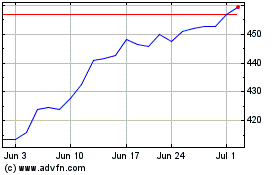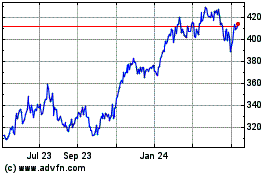Microsoft's SwiftKey Acquisition Could Make Mobile Apps More Productive
February 03 2016 - 5:56PM
Dow Jones News
By Jay Greene
Microsoft Corp., struggling to stake out territory in mobile
computing, on Wednesday snatched up a leader in software that can
make a variety of mobile applications easier to use.
The acquisition of London-based SwiftKey for an undisclosed sum
could give Microsoft competitive advantages not only in mobile
apps, but in emerging areas such as virtual reality, where
SwiftKey's technology could predict users' behavior before they
take action.
SwiftKey's technology is a sophisticated version of the familiar
text-autofill feature. It analyzes typed input, picking up on slang
and trending terms on Twitter, to fill in words before the user
enters them. Its technology is used on more than 300 million iOS
and Android devices.
Neither Microsoft nor SwiftKey executives would discuss the
deal. But in blog posts, the companies noted that Microsoft would
continue to develop SwiftKey for iOS and Android.
SwiftKey learns from users' typing history as well the broader
Internet to predict what users intend to type. It is more than just
whizzy technology, though. It helps trim the time users need to
enter text messages, emails, and other communications, freeing them
to be more productive. It makes Microsoft's apps easier to use as
increasing numbers of users are typing into mobile devices for work
and leisure.
"In this cloud-first, mobile-first world, SwiftKey's technology
aligns with our vision for more personal computing experiences that
anticipate our needs versus responding to our commands, and
directly supports our ambition to reinvent productivity by
leveraging the intelligent cloud," Harry Shum, Microsoft's
executive vice president of technology and research, wrote in a
blog post.
Mr. Shum noted that Microsoft intends to integrate SwiftKey into
Word Flow, on-screen virtual keyboard technology that lets mobile
users swipe from letter to letter rather than lifting their finger
for each letter.
But SwiftKey's predictive technology could enhance other
Microsoft products, as well.
"The big benefit will be beyond the touch-screen keyboard," said
Per Ola Kristensson, leader of the University of Cambridge's
Intelligent Interactive Systems group and an expert in predictive
language technology. "There is a real benefit when the signal is
noisy."
Take Microsoft's augmented reality headset, HoloLens, which
projects digital imagery in front of a user. A virtual keyboard
superimposed on a real-world object or floating in midair requires
much more precise input than a typical mobile-screen keyboard, Mr.
Kristensson said. SwiftKey's predictive analytics could offer
drastic improvements.
It could also enhance products such as Cortana, Microsoft's
virtual assistant that competes with Alphabet Inc.'s Google Now and
Apple Inc.'s Siri. Cortana can read a users' email, with
permission, to help with specific tasks, such as tracking packages.
It can also set reminders based on a users' location.
In addition, the service has predictive features, such as
helping users draft emails and detecting whether language in an
email indicates that a person is about to make a commitment. For
example, if a user were to write, "I'll get back to you by next
week," Cortana would offer to make a calendar invite.
The business model for SwiftKey within Microsoft is less clear.
SwiftKey doesn't charge for the app, but it collects revenue from
in-app purchases such as colors and themes for its keyboards.
Nonetheless, its greater value may lie in making Microsoft's other
apps and services easier, quicker, and ultimately more productive
to use.
(END) Dow Jones Newswires
February 03, 2016 17:41 ET (22:41 GMT)
Copyright (c) 2016 Dow Jones & Company, Inc.
Microsoft (NASDAQ:MSFT)
Historical Stock Chart
From Mar 2024 to Apr 2024

Microsoft (NASDAQ:MSFT)
Historical Stock Chart
From Apr 2023 to Apr 2024
